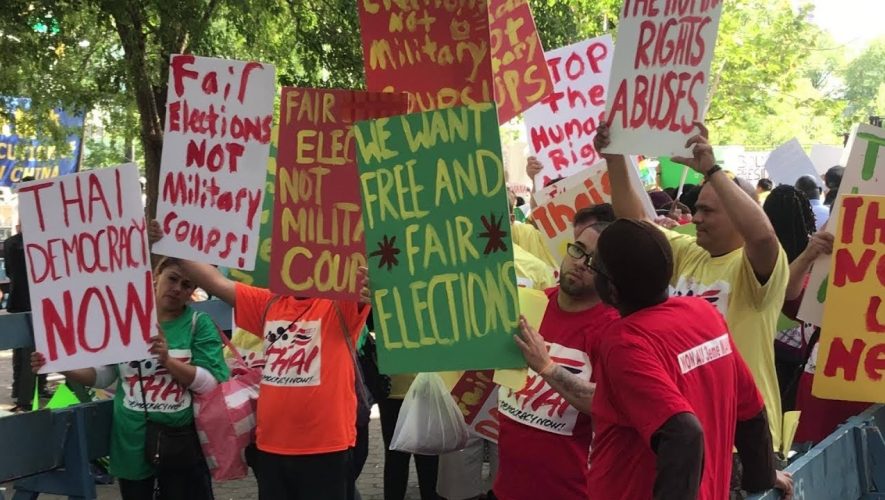In The Hunger Games, Katniss Everdeen represents a covert rebel alliance attempting to topple a repressive regime. When the series was adapted for the big screen, it became a pop culture phenomenon and helped catapult its leading actress, Jennifer Lawrence, to stardom. It also became a symbol of massive anti-government resistance in Thailand.
After General Prayuth Chan-ocha seized power in 2014, five university students launched a movement by demonstrating at one of his events. During his speech, the students stood up, stripped down to their “Don’t Want a Coup” t-shirts, and imitated the novel’s three-fingered salute.
The Revolution Is About All Of Us. Share your own 3-finger salute using hashtag #Unite. pic.twitter.com/QoidZH4tal
— The Hunger Games 🔥 (@TheHungerGames) June 18, 2015
When the salute was first used in the book, “peacekeepers” executed the salute’s originator on the spot. When the Thai students evoked it, the consequences proved less tragic, but still horrific. Once the five were swiftly arrested, General Prayuth asked, with a chilling smile, if “anyone else want[ed] to protest.”
As the event continued, the protesters were taken to a nearby military base, interrogated, and threatened with charges of violating martial law. Intelligence officers ordered them to sign an agreement barring them from future political activity and warned that they would be expelled from university for their actions.
Despite these scare tactics, the students held firm; at one point, they even sang a Thai version of the Les Misérables anthem “Do You Hear the People Sing,” prompting an official to strip them of their anti-coup t-shirts. After the students were released, they were told to return the next day with their parents and were warned that charges could follow.
When the arrests became public knowledge, students gathered at Bangkok’s Democracy Monument to support the demonstrators; they were promptly arrested. Others protested at Hunger Games screenings and were detained. Some protesters avoided arrest by wearing masks, as protests and political gatherings are illegal.
The three-fingered salute from "The Hunger Games" has become a symbol against the #ThaiCoup http://t.co/2ghNEnLQXr pic.twitter.com/xaG9cXWdZ2
— IBTimes UK (@IBTimesUK) June 3, 2014
The salute was a creative response to these bans; it allowed people to showcase their dissent without breaking the law. If a person did not want to take to the streets, they could take to the internet. With the click of a button, tweeters could become resistors by showing three fingers.
Beyond the salute, people demonstrated by reading 1984 publicly or eating sandwiches together at “democracy picnics.” For people in the know, these actions illustrated solidarity; for outsiders, they seemed inconsequential. Others sold bootleg Hunger Games DVDs, perhaps to spread the movement’s message or to capitalize on the buzz.
These actions connected demonstrators and shielded them from government retaliation. In a totalitarian society, this is the key to continued resistance. Because of these demonstrations, Thai leaders criminalized openly reading 1984 and saluting; to prevent further dissent, they also cracked down on counterfeiting.
Principled disobedience can be powerful. It can cause the public to reflect on the rules of public engagement—who gets to speak, where, when, and how. It can also spark curiosity for those who realize that they aren’t in the know. It allows them to engage in politics by learning about a movement and getting involved. As more people discover their agency through demonstrating, governments face more internal opposition and the status quo begins to crack.
Do You Hear the People Sing?
When I use the phrase “principled disobedience,” I do so deliberately. As Dr. Candice Delmas explains in A Duty to Resist: When Disobedience Should Be Uncivil, principled disobedience aims to disrupt the status quo and force people to reconsider it. Civil disobedience is public, non-evasive, non-violent, and in good taste; fail any of those criteria and it becomes uncivil.
In Thailand, protesters have been civil. While they violate the law, they do so publicly, peacefully, and non-offensively. Demonstrators harm no one when they use the salute, read 1984, or have a picnic. But they certainly hurt the government, which is why the acts were criminalized.
This year, the resistance movement was reborn with a new symbol—Hamtaro, an adorable hamster from a show marketed as the next Pokémon. This time, people have taken to the streets to protest the same regime’s forceful dissolution of the Future Forward Party, a political organization established to reduce military control and push progressive reforms. Demonstrators compared the government with hamsters; both run in circles, stuff themselves, and seem content being disconnected from the outside world.
Run! Hamtaro! Run!
Run for Democracy!BGM byt : @AfterRab 🤩💕#วิ่งกันนะแฮมทาโร่ #Hamtaro#FreeYOUTH #SaveThaiDemocracy #respectdemocracyTHAI #ให้มันจบที่รุ่นเรา pic.twitter.com/GY7k08UuC5
— Thaikun 🇹🇭 ช่วยกันทวิตเรื่อง จะนะ เยอะๆนะครับ (@ThaikunBot) July 26, 2020
Some people used the character’s likeness on social media to subtly express their dissent and spread information internationally. Others brought him to demonstrations, carrying plushies and singing an altered version of his theme song—“the most delicious food is taxpayers’ money. Dissolve the parliament! Dissolve the parliament! Dissolve the parliament!”
Soon, the protests started highlighting other issues like the legitimacy of the royal family and the disappearance of Thai dissidents. References to the 2014 protests emerged as demonstrators revived the three-fingered salute. Other pop-culture touchstones emerged, most notably the Harry Potter series. To resistors, the military is akin to Death Eaters, the footsoldiers of the evil Lord Voldemort.
In my opinion, the Dictator doesn't care about everyone know who is behind the violence in abducted #Wanchalerm and other's deaths. Perhaps, they wouldn't considering of our 10 demands & will never lose any power to the citizenry.#ขีดเส้นตายไล่เผด็จการ#WhatsHappeningInThailand pic.twitter.com/AnVkgpkfll
— Satoshi 聰史 😷 (@SatoshiStewart) August 17, 2020
This new movement made ten demands focused on free speech, a free press, a weakened monarchy, and a stronger democracy. The Free Youth movement—a loose group of university student associations and affiliated organizations—added three more: dissolve the parliament, stop harassing critics, and rewrite the constitution.
On August 16, #giveadeadlinetoremovedictators (in Thai) was trending worldwide. It amplified the angry cries of the Thai people who, like the French in Les Misérables, “will not be slaves again.” Thailand’s citizens want democracy, stability, and peace, all of which their history lacks; lives were lost and many suffered from countless military coups over the past two centuries.
How can Thailand spread awareness about their fight? The answer can be found about a thousand miles away.
Milk Tea Alliance
The 2020 Thai protests were partially inspired by the ongoing pro-democracy demonstrations in Hong Kong. In March of 2019, Hongkongers took to the streets after the city’s security bureau proposed allowing extraditions to mainland China. To dissenters, this proposal threatened the delicate autonomy enshrined in Hong Kong’s Basic Law, which allows the region to dictate its own policies and foreign affairs without mainland interference until 2047.
Letting China extradite Hongkongers and foreigners threatens this sovereignty. A US congressional commission asserted that the extradition bill would make Hong Kong more susceptible to China’s “political coercion” and erode its autonomy. The law would legitimize Chinese security operations, putting the state’s dissenters at greater risk. Beijing could abuse this power to target activists and journalists, subjecting them to violence and unfair trials once extradited.
Last year today, over 1.7M #HongKong people marched peacefully between Causeway Bay and Central under extreme weather, against p #PoliceBrutality and reiterated 5 demands.#HongKongProtests #AntiELAB pic.twitter.com/PiYsSQdiId
— Studio Incendo (@studioincendo) August 18, 2020
As protests continued, resistors developed a list of demands. In addition to the bill’s withdrawal, they wanted the government to release all demonstrators, drop charges, and stop mischaracterizing them as “rioters.” Police brutality became a central topic, as clashes between demonstrators and officers became more frequent and violent. Resistors fought with poles, petrol bombs, and other projectiles, while officers wielded guns, tear gas, water cannons, and truncheons.
At first glance, the Hong Kong protests look nothing like the ones in Thailand. When confronted by the police, Hongkongers evaded arrest and defended themselves while Thais accepted their government’s authority. These movements also aren’t fighting for the same goal. Hong Kong protesters resist arrest because they reject China’s authority over them. While Thai protesters share similar grievances, they don’t reject their government outright. Instead, they seek reform.
Still, the movements prove strikingly similar. Neither has a central leader and both reference pop culture extensively. For Hong Kong, it was Pepe the Frog and Bruce Lee’s “be water” slogan; for Thailand, it’s Hamtaro and Harry Potter. Both reference The Hunger Games and Les Misérables, illustrating the interconnectedness of these movements in their fight against oppressive regimes. The two even exchanged supportive messages online using #MilkTeaAlliance.
Support from HongKongers🙆🏼♀️❤️🙆🏼♀️#StandWithThailand #FreeThailand #MilkTeaAlliance https://t.co/jsbEoHmllN pic.twitter.com/tOhrU5HZER
— Hon🖐🏻☝🏻 (@hongy_51) August 16, 2020
When movements trend online, activists across the globe connect and learn of each other’s strife. Social media taught Thais how to organize a leaderless movement and convene to discuss tactics on Zoom. Hashtags spread the movement internationally, increasing awareness and encouraging global resistance.
During the Black Lives Matter (BLM) protests across the United States this year, Hongkongers shared their tactics for handling police brutality through social media. This opened up a channel of communication between the two groups for activists to express their solidarity. US protesters started co-opting the phrase “be water,” hinting that the two movements could unite. But they didn’t.
Despite shared goals and methods, the Milk Tea Alliance hasn’t fully accepted American protesters. There were no BLM protests in Hong Kong; organizers tried to schedule events twice, but nothing came of it. Some Hongkongers couldn’t justify joining a movement that antagonizes their biggest ally, President Trump. Although they disapprove of his domestic policies, they support his tough stance on China. After he signed the Hong Kong Human Rights and Democracy Act last year, demonstrators illustrated their appreciation with placards.
Resistance movements across the globe come from the same cloth of human rights. By ignoring the plights of others to secure your own self-interest, you hurt your movement. Strength is in numbers, so what’s stronger than having the international community by your side?
Global actors can be a driver for change. By protesting and boycotting the South African regime, the world helped formally end apartheid. More recently, the international community created a powerful display when people came together to oppose police brutality in the US.
Beyond sharing information, movements should use social media to organize international displays of solidarity. Hongkongers can learn from their missed opportunity with BLM; through social media, they can connect with Thai protesters more and help coordinate public demonstrations.
Rome was not built in a day. But a stronger and more expansive Milk Tea Alliance could quicken the pace towards democracy and human rights. Principled disobedience forces people to reconsider the status quo, making it an extremely valuable tool. Thais have reintroduced principled disobedience not only within their country, but also throughout the world. The Milk Tea Alliance already includes protesters from Taiwan, India, and Belarus. As an online global coalition forms, authoritarian regimes face increased scrutiny and greater opposition.
If you exert immense pressure on something, it will crack. Let us stand with those like the Milk Tea Alliance in their struggle for democracy and human rights. Share stories and resources across social media; most importantly, don’t forget about the Alliance and don’t look away from these movements just because they don’t affect you. It’s time the international community holds autocratic leaders accountable; until we do, the Death Eaters will prevail.



